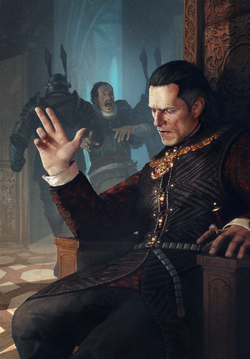
| Emperors rule their empires, but two things they cannot rule: their hearts and their time. Those two things belong to the empire. | |||
| - Emperor Emhyr Deithwen to his wife, The Lady of the Lake | |||
The Emperor/Imperator (Nilfgaardian language: Ker'zaer or Her'zaer)[1] or Empress/Imperatrix is the absolute leader and ruler of the Nilfgaardian Empire. The main imperial domicile, the seat of the court, is the Imperial Palace in the City of Golden Towers but there's also a summer residence in Loc Grim Palace.
Although sharing the realm with a number of barons, counts, dukes, princes, senators, and other aristocrats, the Emperor's rule is totalitarian and disloyalty is often punished by death.[2] The Emperor is also the religious head of state as the hereditary High Priest of the Great Sun.[3]
The personal guard of the Emperor is the Impera Brigade.
Quick Answers

What is the main imperial domicile of the Emperor in the Nilfgaardian Empire?

The Emperor's primary residence in the Nilfgaardian Empire is the Imperial Palace, situated in the City of Golden Towers. This palace is safeguarded by the Impera Brigade. Additionally, the Emperor maintains a summer residence at Loc Grim Palace.
Provided by: Fandom
What is the summer residence of the Emperor in the Nilfgaardian Empire?

In the Nilfgaardian Empire, the Emperor's summer residence is the Loc Grim Palace. This is used when the Emperor is not in the Imperial Palace, the main domicile in the City of Golden Towers.
Provided by: Fandom
What is the punishment for disloyalty in the Nilfgaardian Empire?

In the Nilfgaardian Empire, disloyalty is severely punished. The Empire, known for its ruthlessness, uses extreme measures to defeat enemies. Nilfgaardians demand absolute loyalty from their Emperor, and any sign of weakness can lead to a loss of power. Incompetence is not tolerated, leading to arrests and executions after show trials. Slavery is also used as a punishment, with prisoners and criminals forced into labor or frontline combat.
Provided by: Fandom
What is the Nilfgaardian term for 'Emperor'?

The Nilfgaardian term for 'Emperor' is 'Ker'zaer' or 'Her'zaer'. This is the highest title in the Nilfgaardian Empire, representing the ruler of all lands, the law's tutor, and the commander of the Imperial Army. The Emperor's rule is absolutistic and totalitarian, even though the realm is shared with various aristocrats.
Provided by: Fandom
Notable Emperors
- Torres var Emreis
- Fergus var Emreis
- Usurper (? — 1257)
- Emhyr var Emreis (1257 — 1290s)
- Peter Evertsen as Coadjutor of the Empire in late Emhyr's days
- Morvran Voorhis (1290s — 1301 or earlier)
- Jan Calveit (1301 or earlier — no earlier than 1328)
Trivia
- Ker'zaer sound similar to Kaiser, a German word for emperor used historically in Austria and Germany. The Dutch term keizer is even more similar. On the other hand, her'zaer might come from Herzog and have a similar meaning to Nilfgaardians.
Notes
- In The Witcher 3: Wild Hunt, there's a possibility of Ciri becoming the Empress of Nilfgaard and thus Emhyr's successor, but this contradicts canon (novels by Andrzej Sapkowski) which states that Morvran Voorhis was the successor of Emhyr. In the game, Voorhis alludes that being Emperor is his intention, which he hopes to realize with help from his father. One possible workaround this plothole would be if Morvran ruled together with Ciri.
References
- ↑ The difference in usage between the two is currently unknown. "Ker'zaer" is used more often. "Her'zaer" appears only on a noticeboard posting in The Witcher 3: Wild Hunt and is spoken by Nilfgaardian soldiers in Polish version of Thronebreaker: The Witcher Tales, even though in the English version they tend to go with "ker'zaer".
- ↑ Blood of Elves
- ↑ Wiedźmin: Gra Wyobraźni


